From Costly to Accessible: How New Pathways Are Redefining Professional Licenses
Matt
Founder & CEO of BoardWise

The landscape of professional licensing in the United States is shifting. Historically, licensed professionals have been constrained by state-by-state regulatory regimes that require multiple licenses, duplicative background checks, and separate continuing-education requirements (National Conference of State Legislatures [NCSL], 2024). Two decades of workforce mobility, telehealth adoption, and the COVID-19 pandemic's spotlight on licensure barriers have catalyzed the growth of interstate licensure compacts; statutorily enacted agreements allowing professionals licensed in one member state to practice in others (Nguyen & Schaler-Haynes, 2023). As these frameworks expand, licensed professionals like nurses, physicians, psychologists, and counselors have an opportunity to work across state lines with less friction. This development is reshaping access, equity, professional mobility, and regulatory strategy for the 21st-century workforce.
Understanding Interstate Licensure Compacts
An interstate licensure compact is a legal agreement between two or more states that enables licensed professionals to practice across state borders under a multistate license or through expedited licensure processes (NCSL, 2024). For example, the Nurse Licensure Compact (NLC) allows a nurse licensed in a compact member state to practice in any other compact state without obtaining additional licensure (Wikipedia, 2025). In a workforce era defined by mobility, travel nursing, telehealth, remote work, such mechanisms reduce administrative burdens while preserving regulatory oversight (Milbank Memorial Fund, 2023). As of early 2025, several health-care licensure compacts exist, with others in development for behavioral-health providers, social workers, dieticians, and other licensed categories (Milbank Memorial Fund, 2023; Kaiser Permanente Institute for Health Policy, 2025).
Why Compacts Matter for Licensed Professionals
First, they increase professional mobility and value. Professionals no longer must maintain multiple state licenses when they relocate or take jobs across state lines; instead, one multistate credential suffices under compact rules (NCSL, 2024). Second, compacts can reduce redundancy in licensing processes; fewer background checks, quicker approvals, and streamlined renewals. For example, mental-health compacts have demonstrated shortened approval timelines by leveraging shared credentialing infrastructure (Kaiser Permanente Institute for Health Policy, 2025). Third, compacts have implications for equity and access. Licensed professionals practicing across state lines can serve underserved, rural, or border-region communities more effectively, thereby helping reduce provider shortages and improve continuity of care (Nguyen & Schaler-Haynes, 2023).
Challenges and Considerations
Despite their promise, licensure compacts are not a silver bullet. One limitation: they do not increase the national pool of licensed professionals; they simply permit existing providers to work in new jurisdictions (Nguyen & Schaler-Haynes, 2023). Additionally, states may be cautious about joining compacts due to concerns about loss of regulatory control, revenue impacts for state boards, and local practice-standards variance (NCSL, 2024). Telehealth, while supported by compacts, poses questions around care-quality, jurisdictional oversight, and state-specific practice environments (Milbank Memorial Fund, 2023). Finally, many licensed professions remain outside compact frameworks, meaning that significant administrative burdens persist for these providers as well (Kaiser Permanente Institute for Health Policy, 2025).
What This Means for Professionals and Platforms Like BoardWise
For professionals and platforms that support them, these developments represent strategic opportunities. If your profession falls within a compact or is moving toward one, staying informed about eligibility requests, fees, continuing-education obligations, and technological tools becomes imperative. For a platform like BoardWise, integration with multistate-license data, cross-state compliance workflows, and automated alerts for jurisdictional changes could become differentiators. By proactively aligning with compact infrastructure changes, licensed professionals and legal-tech platforms can gain early-mover advantage.
Conclusion
Interstate licensure compacts are redefining the architecture of professional practice in the United States. They reduce barriers, promote mobility, and align regulation with modern workforce realities. Yet they also pose new questions for regulation, data sharing, and oversight. For licensed professionals, this evolution demands awareness and strategic positioning. For platforms like BoardWise, it offers a design blueprint: build for mobility, compliance, and cross-jurisdictional workflows. The future of licensure is less about state borders and more about seamless access, and those who adapt will lead the next wave of professional practice.
References
- Kaiser Permanente Institute for Health Policy. (2025, July 18). How can interstate compacts expand access to mental health care? Kaiser Permanente Institute for Health Policy. https://www.kpihp.org/blog/expanding-access-to-mental-health-care-through-interstate-compacts/
- Milbank Memorial Fund. (2023, April 11). Can interstate licensure compacts enhance the health care workforce? The States of Health. https://www.milbank.org/2023/04/can-interstate-licensure-compacts-enhance-the-health-care-workforce/
- National Conference of State Legislatures. (2024). Are interstate compacts an answer to health workforce shortages? NCSL. https://www.ncsl.org/events/details/are-interstate-compacts-an-answer-to-health-workforce-shortages
- Nguyen, A. M., & Schaler-Haynes, M. (2023). Trends in US state and territory participation in interstate healthcare licensure compacts. Journal of Medical Regulation, 111(1), 8. https://meridian.allenpress.com/jmr/article/111/1/8/506415
- Office of the Assistant Secretary for Planning and Evaluation. (2024, August 1). Barriers and opportunities for improving interstate licensure. U.S. Department of Health & Human Services. https://aspe.hhs.gov/sites/default/files/documents/405ad876b1de337a.pdf
